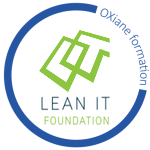Prochaines sessions
Programme
Day 1 :
- Introduction of Lean
- The Customer
- The Process
- Performance
Day 2 :
- The Lean Organization
- Behavior and Attitude
- Problem Solving
- Wrapup and Mock Exam
- Exam
Module 1: Course Introduction
- Information on the course structure
- Information on the types of activities included in the course
Module 2: Introduction of Lean
- Lean principles and how are they related to each other
- Three causes of poor quality and their details
- Analyzing waste through analyzing activities
- Cost of poor quality
- PDCA and it’s description
- Definition, characteristics, and dimensions of Lean IT
- Shingo Prize Model
Module 3: Customer
- Voice of customer
- Types of customer value Critical to Quality (CTQ)
- Tree and analysis of voice of customer using CTQ
- Sources of improvement opportunities
Module 4: Process
- Definition and key components of process
- Distinction between value demand and failure demand
- Defining SIPOC and COPIS
- Steps to create value stream map and symbols used in value stream map
- Flow principle and examples of Muda in value stream
- Examples of different types of activities: value adding, necessary non value-adding, and non value-adding
- Push versus pull
- Improving the process through 5S, Heijunka, and Improvement Plan
Module 5: Performance
- Performance versus results
- Key performance indicators vs. metrics
- SMART KPIs
- Three questions to define correct measurement
- KPIs and behavior
- Aspects of KPI
- Time as currency and production factor
- Skills and knowledge as capacity
Module 6: Lean Organization
- Organizing for Lean IT
- Structure around the value chain
- Ensuring speed of communication
- Performance dialogue and feedback model
- Personal versus team performance and three topics of performance dialogue
- Visual management boards and their types
Module 7: Behavior and Attitude
- Attitude and behavior
- Lean attitude, Lean mindset, and Lean behavior
- Characteristics of Lean Manager and Lean leadership
- Expectations of people from Lean transformation and Lean improvement
Module 8: Problem Solving/Kaizen
- Kaizen versus Kaikaku
- Five intents and three qualifications of Kaizen
- Running a Kaizen event
- DMAIC and tools used in each phase of DMAIC
Evaluation
- The exam is closedbook format
- The exam consists of 50 multiplechoice questions
- A minimum score of 75% is required to pass the exam
- The exam lasts 60 minutes

